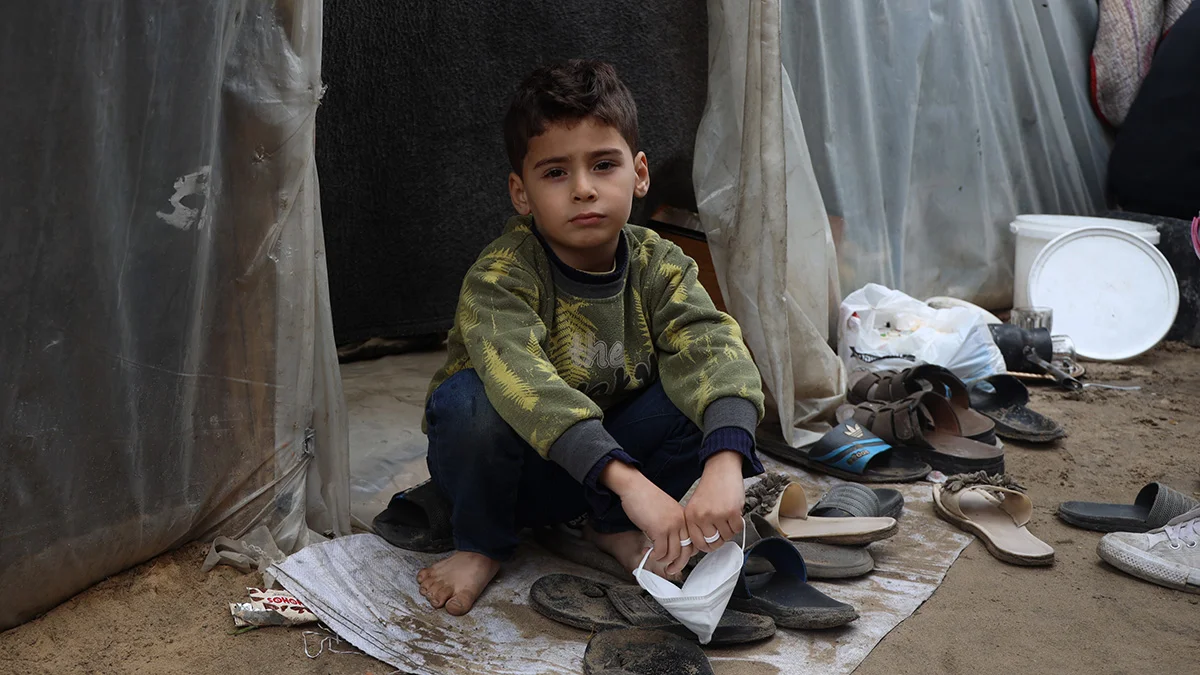Statement by Jonathan Crickx, Head of Communications for UNICEF in Palestine.
"UNICEF estimates that at least 17,000 children in the Gaza Strip are unaccompanied or separated. Each one, a heartbreaking story of loss and grief.
This corresponds to 1% of the overall displaced population - 1.7 million people.
Of course, this is an estimation since it is nearly impossible to gather and verify information under the current security and humanitarian conditions.
I returned from Gaza this week. I met many children, each one with her or his own devastating story to tell.
Of 12 children I met or interviewed, more than half of them had lost a family member in this war. Three had lost a parent, of which, two had lost both their mother and their father. Behind each of these statistics is a child who is coming to terms with this horrible new reality.
11 year old Razan was with her family in her uncle’s house when it was bombed in the first weeks of the war. She lost almost all her family members. Her mother, father, brother, and two sisters were killed. Razan's leg was also injured and had to be amputated. Following the surgery, her wound got infected. Razan is now being taken care of by her aunt and uncle, all of whom have been displaced to Rafah.
In a center where unaccompanied children are hosted and cared for, I also saw two very young children aged 6 and 4. They are cousins and their entire respective families were killed in the first half of December. The four year old girl - in particular - is still very much in shock.
I met these children in Rafah. We fear that the situation of children who have lost their parents is much worse in the North and the Center of the Gaza Strip.
In the middle of a conflict, it is common for extended families to take care of children who lost their parents. But currently, due to the sheer lack of food, water or shelter, extended families are distressed and face challenges to immediately take care of another child as they themselves are struggling to cater for their own children and family. In these situations, immediate interim care must be made available at scale while keeping children connected to or tracing their families so that they can be reunited when the situation stabilizes.
Razan, like most of the children who went through such a traumatic experience, is still in shock. Each time she recalls the events, she falls in tears and gets exhausted. Razan's situation is also particularly distressing since her mobility is severely limited and specialized support and rehabilitation services are not available.
Children’s mental health is severely impacted. They present symptoms like extremely high levels of persistent anxiety, loss of appetite, they can’t sleep, they have emotional outbursts or panic every time they hear the bombings.
Before this war, UNICEF was considering that more than 500,000 children were already in need of Mental Health and Psychosocial support in the Gaza Strip. Today, we estimate that almost all children are in need of MHPSS, more than 1 million children.
UNICEF and its partners have provided mental health and psychosocial support to more than 40,000 children and 10,000 caregivers since the beginning of this conflict. I attended one of these activities and it is really a relief to see children play, draw, dance, sing and smile. It helps them to cope with the terrible situation they are going through. But of course, this is far from sufficient when we see the scale of the needs.
The only way to have this mental health and psychosocial support delivered at scale is with a ceasefire. Before this war, in 2022, the child protection cluster led by UNICEF provided this support to nearly 100,000 children. It is possible to scale up now. We have done it before. But it is not possible under the current security and humanitarian conditions.
Before I conclude, I would like to add just one thing. These children don’t have anything to do with this conflict. Yet they are suffering like no child should ever suffer. Not a single child, whatever the religion, the nationality, the language, the race, no child should ever be exposed to the level of violence seen on the 7th of October, or to the level of violence that we have witnessed since then."






